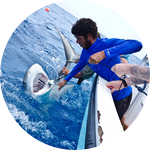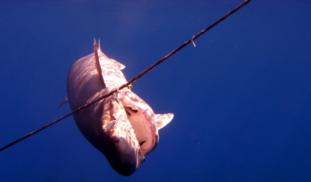Please wait...
About This Project
Shark populations are being fished at unsustainable levels throughout much of our oceans. Because deep sea sharks grow slowly and have few offspring, they are particularly susceptible to overexploitation. We hope to better understand the effects of capture on two species of deep sea sharks, the gulper and the Cuban dogfish, as well as identify their chances of survival if released alive. Visit the abstract page for more details!

Browse Other Projects on Experiment
Related Projects
Hippos as sentinels: Detecting pollution and pathogens
In western Uganda, hippos move between land and the Kazinga Channel, making them ideal sentinels of ecosystem...
Documenting unique plant and insect species within Siskiyou County's biodiverse landscape
The biodiversity in Siskiyou County is inadequately documented because of prior inaccessibility. We seek...
Empowering coastal youth for enhanced coastal and mangrove monitoring amidst massive sargassum landings.
The Caribe Mexicano MPA, home to 50% of the western hemisphere's largest barrier reef, has faced massive...



